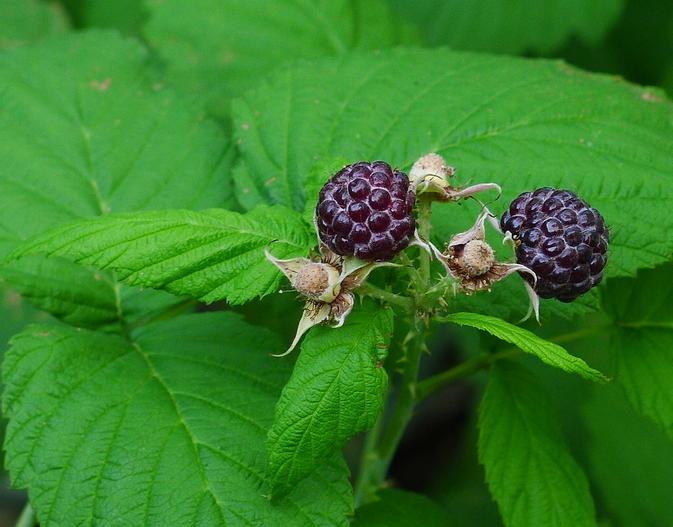Whitebark Raspberry
(Rubus leucodermis)
Whitebark Raspberry (Rubus leucodermis)
/
/

Alvin Kho
CC BY-SA 2.0
Image By:
Alvin Kho
Recorded By:
Copyright:
CC BY-SA 2.0
Copyright Notice:
Photo by: Alvin Kho | License Type: CC BY-SA 2.0 | License URL: https://creativecommons.org/licenses/by-sa/2.0/ | Uploader: chipmunk_1 | Publisher: Flickr


























































Estimated Native Range
Summary
Rubus leucodermis, commonly known as Whitebark Raspberry, is a deciduous shrub native to the western regions of North America, including the Pacific Northwest and the Rocky Mountains. It thrives in open woodlands and forest edges, often in moist, well-drained soils. This species typically grows to 0.5–2.5 m (1 ft 8 in – 8 ft 2 in) in height, with prickly shoots and a perennial crown. The canes are biennial, growing vegetatively in the first year, flowering and fruiting in the second, then dying. The Whitebark Raspberry’s leaves are pinnate, with five leaflets on the vigorous first-year stems and three on the flowering branchlets. Its flowers are white, occasionally light purple, and bloom in spring to early summer. The fruit is a notable feature, starting red to reddish-purple and turning dark purple to nearly black when ripe, measuring 1–1.2 cm (0.39–0.47 in) in diameter.
The plant is valued for its edible fruit, which is used in culinary applications, and for its wildlife-friendly attributes, as it provides food for birds and mammals. It is also appreciated for its ornamental qualities, such as the attractive foliage and the showy white flowers. In cultivation, Whitebark Raspberry requires full sun to part shade, consistent medium moisture, and well-drained soil. It is suitable for naturalistic plantings and can be used for erosion control on slopes. However, gardeners should be aware of its potential to spread aggressively via root suckers and tip layering, which can be managed through regular pruning.CC BY-SA 4.0
The plant is valued for its edible fruit, which is used in culinary applications, and for its wildlife-friendly attributes, as it provides food for birds and mammals. It is also appreciated for its ornamental qualities, such as the attractive foliage and the showy white flowers. In cultivation, Whitebark Raspberry requires full sun to part shade, consistent medium moisture, and well-drained soil. It is suitable for naturalistic plantings and can be used for erosion control on slopes. However, gardeners should be aware of its potential to spread aggressively via root suckers and tip layering, which can be managed through regular pruning.CC BY-SA 4.0
Plant Description
- Plant Type: Subshrub, Vine
- Height: 4-6 feet
- Width: 3-5 feet
- Growth Rate: Rapid
- Flower Color: N/A
- Flowering Season: Spring
- Leaf Retention: Deciduous
Growth Requirements
- Sun: Full Sun, Part Shade
- Water: Medium
- Drainage: Medium
Common Uses
Bee Garden, Bird Garden, Butterfly Garden, Edible*Disclaimer: Easyscape's listed plant edibility is for informational use. Always verify the safety and proper identification of any plant before consumption., Fragrant, Hummingbird Garden
Natural Habitat
Open woodlands and forest edges in the western regions of North America, including the Pacific Northwest and the Rocky Mountains
Other Names
Common Names: Blackcap Raspberry, Blue Raspberry
Scientific Names: , Rubus leucodermis, Rubus leucostachys, Rubus occidentalis var. leucodermis, Rubus douglasii, Melanobatus leucodermis, Rubus occidentalis subsp. leucodermis,
GBIF Accepted Name: Rubus leucodermis Douglas ex Hook.